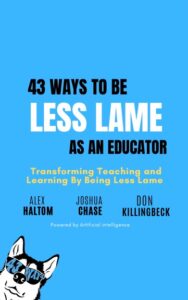A competitive beard judge, world-class jump roper, author, edtech leader, and, most notably, an experienced superintendent, this district leader will forever understand the importance of technology in the classroom.
Dr. Don Killingbeck, superintendent of Hemlock Public Schools in Michigan, is arguably one of the least lame education leaders out there, which will make more sense later. His district, which is home to around 1,200 students, has become the most stable, fiscally solvent and highest-achieving it’s ever been. Contrary to what the national narrative would suggest, it’s fully staffed.
“People want to work in this community,” he says.
Part of the reason is his devotion to the profession, he argues.
“Growing up, I didn’t think I was going to be a school superintendent,” according to Killingbeck. “I always thought I’d drive a nice car, have a nice house and wear nice suits. But my life is so much richer because of the work that I do and my family’s involvement in it. We treat it as a vocation. A calling.”
Another contributing factor to the success of his district, without a doubt, is his understanding and embracing of technology. The future waits for no one. And if we’ve learned anything since the pandemic, edtech is here to stay.
Killingbeck has a YouTube channel devoted to the school community. It essentially serves as a library for the district, he explains. “I typically post over the shoulders,” he says. “It’s a real Mr. Rogers entry and exit. I write and produce everything.”
For example, in his holiday edition, he’s cooking candy bacon with a custodian. The whole purpose is to give people an inside look into the great things the district is doing.
His innovative and inspiring use of technology in education has always been an important part of his teaching, he says. Killingbeck earned his first master’s degree from Michigan State in edtech and instructional design. And when asked if his perception of technology and edtech has changed since the pandemic, he responded, “No.” and that was a hard no.
“As a teacher in the 90s, I wrote a grant and got one of the first for customer use smartboards,” he says. “I mean, literally, I was light years ahead. I had a projector, a smartboard and a laptop and I was able to broadcast my PowerPoint to the screen and write with a digital marker.”
“So fast forward to March 12, 2020, the governor said, ‘You’re closed today.’ On that Thursday night, she said kids would go in the next day to gather their stuff and come home for the next two weeks. Literally, on Monday we were providing some sort of online education to our kids at home on March 16. For me, that’s what was right for our kids and our community.”
This was absolutely necessary for the success of his students. Unfortunately, he says, as he looked at the landscape across Michigan and the nation, there were kids that went months, even years with a “subpar opportunity to learn.”
“I don’t think we were nailing it on March 16 when it comes to learning,” he clarifies. “But when it comes to providing something, I don’t know of any other school that was able to do that.”
Nowadays, he’s helping educators and administrators understand the importance of being less lame. Because, “Who wants to be lame?”

With the help of the artificially intelligent chatbot ChatGPT, he and his colleagues wrote 43 Ways to Be Less Lame as an Educator. The publication has made headlines as talk around ChatGPT continues to dominate the K12 sphere, both for its controversy and its potential for greatness in the classroom. Killingbeck would tell you that educators and leaders have a responsibility to embrace AI in education or else they’ll miss their mark.
“I think we need to lean in as educators because, let’s face it, there are people out there going, ‘This is bad. It’s everything we’ve told kids not to do,'” he says. “People are going to say we shouldn’t be using this and kids shouldn’t be touching it. The bottom line is in the real world we’ve got to be more productive. There are only 24 hours in a day. How are you going to make the most out of them? I think a tool like ChatGPT will maximize that opportunity.”
The book he co-authored with two colleagues is designed to be a “secular devotion for teachers,” he explains. It’s something they can meditate on and allow to positively influence the work they do each day.
“If you’re a teacher, one of the chapters is how to better manage your class,” he explains. “Or, how to better manage your school building if you’re a principal. So the idea is you focus on one of those chapters each week.”
Quite literally over one weekend Killingbeck “generated” the book with the help of ChatGPT. Of course, some edits were made to add that personal, human feel. But overall, he says, the book is nearly 50% human and 50% AI.
During an interview with District Administration, he couldn’t help but demonstrate some of the amazing capabilities of ChatGPT, like writing a rather catchy rap song about any given topic, for example.

“Guess how many times I’ve written a rap song,” he says jokingly. “Absolutely none! But now, I might be inspired as a student. I might be inspired to come up with some lyrics. And now all of a sudden, I might be able to do that!”
“Now, it needs to be used ethically,” he adds. “It needs to be disclosed. Nobody should be using it and acting like it’s 100% their work.”
Tools like ChatGPT bring a certain level of excitement to learning, according to Killingbeck. Before, students relied simply on their textbooks or their notes for inspiration. Now, they can ask the chatbot to write a historically accurate song or poem that catches their interest, which inevitably stimulates engaging learning.
“Now all of a sudden, a kid goes from, ‘I don’t want to learn about George Washington,’ to this level of excitement that is so less lame,” he says. “We need to own it and teach kids how to ethically use this type of technology.”
More from DA: Leadership series: How this 4th-generation Warsaw Tiger serves his home district










